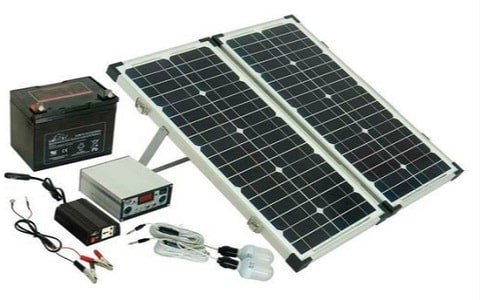A solar inverter, also known as a PV or photovoltaic inverter, is one of the most vital components of a solar energy system. Why? Because its primary function is to act as the energy system’s central control unit.
The main function of a solar inverter is to convert the direct current (DC) generated by solar panels into alternating current (AC), which can then be used by electrical appliances in your home or place of work. In other words, without a solar inverter, you won’t be able to use any of the energy your solar panels generate.
This makes the solar inverter a crucial element in a solar power system so including its cost when thinking of solar panel installation is mandatory. But first we must survey the price for solar panels in the uk so we can decide either to move forward with the installation process

Image Source: Luminous
How Exactly Does a Solar Inverter Work, Anyway?
As we explained earlier, a solar inverter converts the direct current generated by solar panels into a form that can be used by electrical appliances in your home or office. This form is known as AC or alternating current electricity.
Solar panels are installed on your roof and collect energy from sunlight. They are designed with a special material — semiconductor layers of crystalline silicon — which absorbs the sun’s rays and converts the solar energy into an electric current — but in direct current form.
This energy is then either directly sent to the solar inverter for your immediate use or stored in a battery for use later, depending on the type of solar system installed in your home. Most household appliances require alternating current; the solar inverter meets this need by transforming the direct current energy generated by solar panels by passing it through a transformer to generate an alternating current output.
The Functions of a Solar Inverter
The primary work of a solar inverter is, indeed, the essential conversion of solar energy from direct current into alternating current for your use. However, the solar inverter also performs many other important functions in a solar system, which is why it is vital that users purchase them only from trusted and reliable brands like Luminous.
Other functions of a solar inverter include:
- Communicating With Your Local Power Grid
A modern solar inverter offers various grid-supporting functions such as communication, frequency and voltage monitoring, and controls in terms of when to draw power from the grid. A high-quality solar inverter can also quickly detect and respond to minimal disturbances in your power supply, such as voltage changes, and shut down if necessary.
- Maximising Power Output from a Solar System
A solar inverter constantly monitors and keeps note of the voltage produced by solar panels to determine the maximum power at which the modules can operate. A solar inverter, consequently, can quickly and easily identify if any parts of your solar panels are deteriorating or if shading is occurring due to environmental obstructions such as trees or buildings. In other words, a solar inverter works tirelessly to ensure that the solar power system is producing energy at maximum capacity at all times.
- Providing Useful Analytics About the System
Not only does a solar inverter optimise and maximise your system’s power production, but it also keeps a close eye on the solar system’s power output, including important metrics like error codes, power reduction data, and diagnostics. When necessary, a solar inverter can offer this information to users or technicians to help address any issues that may develop in your system
- Protecting Your Appliances and Your Home
The best solar inverter in the market today — such as the ones manufactured by Luminous — is designed to shut down in the event of any odd behaviour from any aspect of the system, be it an electrical arc caused by system ageing or material degradation, or a sudden surge in power from the grid.
When it comes to a solar inverter, quality and trust cannot be compromised on. However, every home and residential property has different solar energy requirements, and the most effective approach to determine which solar inverter suits your needs is by evaluating the amount of energy you typically use.
